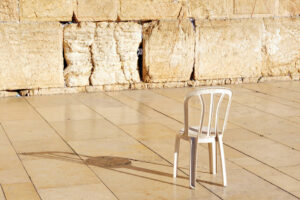Borrow the Joy!
Reb Aharon of Kiblitch was a very happy person. He was so filled with joy that other chassidim envied him. Despite his poverty, he was always happy. No surprise, then, that he was accomplished at bringing joy to a heavy heart. Usually only a few words from him were enough to transform gloom to joy.
He would often dance, celebrating his spirituality. When asked how he could always dance with such enthusiasm, he replied, “Well, naturally, at times the evil within accosts me and says, ‘Why are you dancing? What do you have to be happy about now?’
“I reply, ‘Even if I really don’t feel happy right now and can’t find a reason to be happy at the moment, I can still borrow the joy. I know that in the Ultimate Future, there will be a lot to rejoice about. I dance because the joy I will have then is worth dancing about. Why shouldn’t I borrow from that joy right now and express it in dance?’”
A certain poor bride and groom got married without a kopek to their names. They literally couldn’t afford food for a festive meal. After the chuppah, the guests quietly left the premises. The couple was so devastated that they began to cry.
Someone raced to Reb Aharon and told him their tale of woe. “Is it that awful? What can we do?” he cried.
He rushed to raise money for them to serve a meal. As the food was being prepared, he began to dance. His dances were so wondrously joyous and alive that the couple began to rejoice, too. A crowd gathered to enjoy Reb Aharon’s fancy footwork, and soon they were so caught up in his joy that they, too, started to celebrate and gladden the now happy couple.
On another occasion, someone asked Reb Aharon why he didn’t attend the weddings of the wealthy and only went to celebrate with the poor. Reb Aharon answered, “It’s only fair, my friend. The wealthy have money to buy meat and fish and other delicacies that bring joy to the bride and groom and all their guests. They don’t really require my assistance. But at an affair that lacks fish, meat and delicacies, that’s where I’m truly needed!”
Based on Siach Sarfey Kodesh V:215, 236, 238
- 0 comment


















